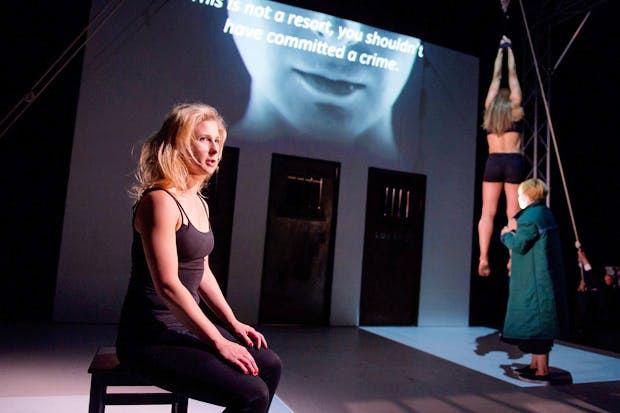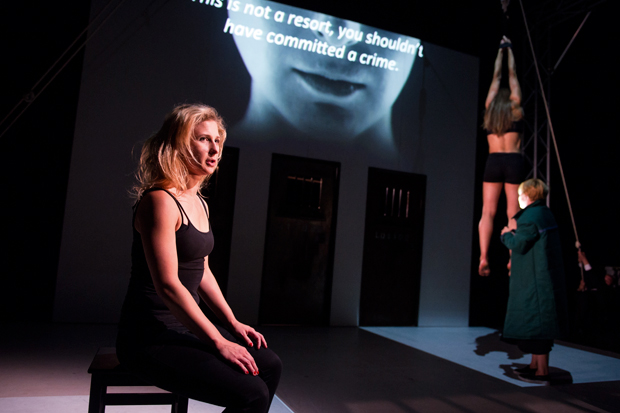‘Prison did not touch me,’ declares Pussy Riot’s Maria ‘Masha’ Alyokhina, raising her eyebrows with a sardonic smirk.
I am squeezed into a booth at the intimate Soho Theatre bar with the dissident turned touring actress. In a few hours time, on this long summer evening, the protest play Burning Doors will unveil its London premier. Alyokhina is a virgin to the stage. But having already survived solitary confinement in a Russian jail, not to mention whipping by Cossacks on horseback at the Sochi 2014 Winter Olympics, she seems unperturbed.
In 2012, Alyokhina gave a massive ‘up yours’ to the Russian establishment with a guerrilla performance of Virgin Mary, redeem us of Putin in Moscow’s most important cathedral. Back then she was anonymous: Pussy Riot hid their identities in bright neon tights and full-face yellow, purple, and blue balaclavas, a punk feminist tribe of bankrobbers-meets-Ab Fab.
It all seemed faintly ridiculous. Except this was no comedy. Alyokhina and two of her fellow members were charged with hooliganism. She was sent to a penal colony away from her young son (now nine and living with his father). Released in late 2013 as part of an amnesty, Alyokhina is a dissident with star power. That Burning Doors, which played in Melbourne recently, was funded by a kick-starter campaign (£17,000 was raised) is testament to her draw.
The collaboration between Alyokhina and the underground Belarus Free Theatre, banned in its native Minsk, tells the stories of three political prisoners: Alyokhina (who appears as herself); Ukrainian filmmaker Oleg Sentsov, currently serving a 20-year prison sentence; and Russian artist Pyotr Pavlensky.
Pavlensky lends Burning Doors its title. Last year he doused the entrance of the Russian Federal Security Service with gasoline and set it alight. In political protest he has also sewn his mouth shut, wrapped himself naked in barbed wire, cut off his earlobe, and nailed his scrotum to the stones of the Red Square in Moscow. ‘In the hand of the masterful puppeteers fear becomes the weapon. Our security services use fear to control society,’ says Alyokhina. In his symbolic gesture Pavlensky literally ‘burned down the doors of fear’. Fear, though, also exists amongst the authorities, unsure what to do with Pussy Riot, now an international cause célèbre. Alyokhina, for one, has refused to leave Moscow or to quietly go into the night without a fight. ‘We don’t have a club of membership with special cards. It’s totally open thing. If you do something as a Pussy Riot, you are a Pussy Riot, it’s very simple,’ she says. ‘If you are in the collective you feel what everybody feels. This is, I think, the most strange and incredible thing – that we are in one sense a kind of one body. And this really is empowering.’ She grins. ‘Empowering. I like this work.’ Still, Alyokhina’s enemies are widespread. When Pussy Riot performed their punk prayer, Patriarch Kirill, head of the Russian Orthodox Church, decried: ‘The devil laughed at us’.
With her intense blue eyes and thick, waxy blonde hair, which reminds me of a Botticelli, Alyokhina comes across more fiery imp than Satan. Small and sinewy, with a gravelly, husky voice (‘it’s because of the show,’ she shrugs), she fidgets with her hands, drinks strong coffee, and jumps up throughout our conversation to go outside for a fag. Alyokhina is wary of her own unveiling, which exposed her to the press and to the (not always sympathetic) public. ‘Everybody understands that prison is something terrible,’ she says. Few understand that ‘all this attention… is this huge responsibility. You feel it every moment. This is a trial.’
Burning Doors has forced her to ‘look at the mirror’. The play – made up of sketches and scorching, painful to watch physical theatre – addresses the ugly realities of imprisonment. For Alyokhina these ranged from graphic forced gynaecological examinations, in which she was routinely and humiliatingly stripped naked and searched, to her five months in solitary confinement.
‘The idea is to take the scariest moments, the moments which I’m afraid of, and go through them again and again.’ She pauses. Then confesses, quietly. ‘You don’t want to look at yourself. You want to act, you want to live, you want to help people. And day, by day you should look to the fucking mirror. And everything was there. Loneliness, drugs…’ she tails off. ‘A lot of things.’ In the middle of Burning Doors the lights go up and Alyokhina takes questions from the audience. On stage she is the same as she is in life: defiant, cynical, hard to impress, with a wry demeanour, and broken, staccato English.
A daughter of Russian mathematicians, Alyokhina, a vegan, has always been drawn to an alternative lifestyle. When I ask what relationship she has with her son’s father, she gives a small, knowing smile. ‘I have problems with this traditional [label]. We don’t have any stamps or something like this. He’s in my closest circle in my life – I think I love this.’ She winks. ‘He’s not the only one there.’
If it seems like little can break Alyokhina, she too can succumb to anxiety. ‘My English,’ she starts, then stops, wrapping and unwrapping the packaging around an uneaten biscotti. ‘Very hate my English. Okay. So yes of course I’m not extraordinary somebody – I have problems with fear. But the main lesson which I made from it: If you feel the fear, go free it. If you will beat it again and again you will grow. And that is what I understood very, very far, I think in my teenage age. I understood what we call “difficult” can make you stronger.’
Acting is ‘like a small death every time’. It is yet another kind of exposure, which leaves her perhaps more vulnerable than she’d like to admit, despite her bravado and bravery. If Burning Doors, though, exposes the world of Putin and his cronies even a little more, if it edges him further into the glaring spotlight, it has been worth it. They ‘are protected by the system but the system has holes,’ says Alyokhina. Then, suddenly, she gives a hyena-pitched cackle and looks me straight in the eye. ‘I want those people who thought that they had absolute power to become red and to afraid me. When they lose that control they suddenly become honest. This is true beauty.’
Got something to add? Join the discussion and comment below.
Get 10 issues for just $10
Subscribe to The Spectator Australia today for the next 10 magazine issues, plus full online access, for just $10.














Comments
Don't miss out
Join the conversation with other Spectator Australia readers. Subscribe to leave a comment.
SUBSCRIBEAlready a subscriber? Log in